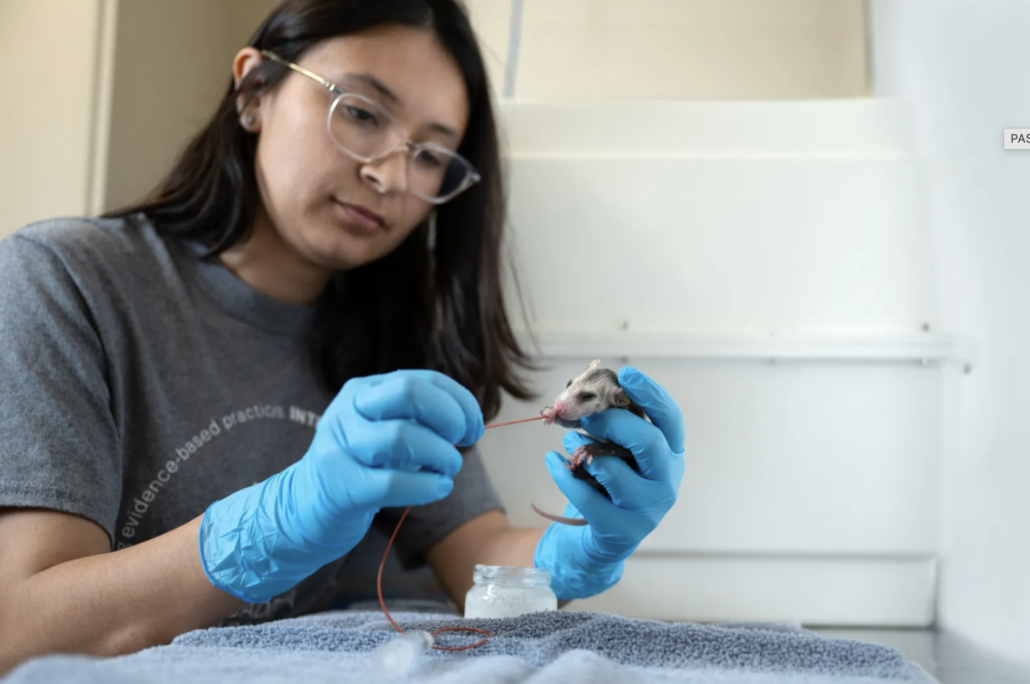Wildlife helplines give advice on helping, or not, sick wildlife

A Pasadena Humane staff member feeds an orphaned baby opossum at the Sandra J. Goodspeed Wildlife Center. Learn more about wildlife rehabilitation at our “Wildlife Walk and Talk” on Saturday, Aug. 16, at Hahamongna Watershed Park. Find details and register at pasadenahumane.org/wildlife.
When the Eaton fire tore through our community earlier this year, it wasn’t just people and pets who felt the impact. Thousands of wild animals were displaced, injured, or orphaned by the blaze.
At Pasadena Humane, our wildlife team worked around the clock to care for animals affected by the fire. We treated birds with singed feathers, animals suffering from smoke inhalation, and provided wound care for burned paws and talons. We also worked to rescue wildlife that were caught in abandoned pools and cisterns after the fires had burned out.
As the flames spread, wildlife fled into surrounding neighborhoods looking for safety. But instead of refuge, many encountered new dangers. Animals used to the tranquil foothills suddenly found themselves navigating busy streets, fenced yards, and unfamiliar territory.
Just a few days after the fire, we received a call about a bobcat struck by a car on Foothill Boulevard in Pasadena. Our veterinary team, led by Chief Veterinarian Dr. Maria Pyrdek, responded quickly.
X-rays done back at the shelter revealed that the bobcat had a badly fractured pelvis. After receiving care and rehabilitation at our facility and with a partner organization, he was safely released back near the area we believed had been his home prior to the fire.
That bobcat is just one of the thousands of wild animals treated each year at Pasadena Humane’s Sandra J. Goodspeed Wildlife Center. While natural disasters draw attention to the challenges wild animals face, most of the wildlife entering our shelter aren’t fire-related at all.
The majority of patients in our care are animals commonly found in our neighborhoods, such as squirrels, opossums, skunks and birds. These animals may be injured, sick, or orphaned, often due to unintended human interference.
To help community members determine whether a wild animal needs help, we operate a Wildlife Helpline. Our trained staff and volunteers offer guidance over the phone, helping people make informed decisions about when to step in. And when intervention is needed, our team is ready.
But wildlife rehabilitation is about more than helping individual animals. As Dr. Pyrdek explains, it also plays a vital role in protecting entire ecosystems and public health. Wild animals can serve as sentinel species, showing early signs of disease or environmental contamination that could eventually impact people and pets.
Since wild animals are typically smaller than pets or humans, they will show signs of illness sooner from a chemical in the environment. For example, a mouse spending their time in the dirt may be exposed to large amounts of lead and other heavy metals in the soil. When a predator, such as a hawk or owl, eats these mice, the toxins build up over time, eventually making them sick.
When we see these predators suffering from lead poisoning at our clinic, we know our children and pets in the same areas are also being exposed. Even if they aren’t showing illness yet, this can sound the alarm to take action before it’s too late!
People often don’t realize wildlife is nearby until they encounter an injured animal. That encounter can be transformative.
As Dr. Pyrdek puts it, wildlife rehabilitation not only helps the animal, but it also sparks awareness and care in the person who found it. Suddenly, they want to know more. What kind of animal is this? What happened to it? Will it recover?
That moment of curiosity opens the door to education. It reminds us that we share our neighborhoods and foothill communities with a wide variety of animal species. And that humanely co-existing alongside them benefits us all.
On Saturday, August 16, Dr. Pyrdek will co-lead a “Wildlife Walk and Talk” at Hahamongna Watershed Park in Pasadena. Attendees will learn about local wildlife, rehabilitation, what to do if you find distressed wildlife, and how wildlife rehabilitation contributes positively to the overall health of our local ecosystems.
To learn more or sign up, visit pasadenahumane.org/wildlife
Chris Ramon is president and CEO of Pasadena Humane. pasadenahumane.org
This blog post originally appeared as a column in the Pasadena Star-News on August 7, 2025.


